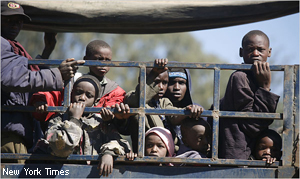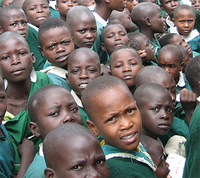
Kevin
Kraft, OP: on power sharing agreement FEBRUARY 17, 2008
We had the monthly Dominican Laity meeting today after our 10:00 AM Sunday Mass, and we had a good attendance of 10 laity plus myself. We had a good meeting with an hour and a half of formation themes, and then nearly a two hour business meeting, reviewing plans for a variety of activities coming up during the year. But the most interesting was the informal sharing in between those blocks of time, and towards the end of the business part of the meeting some questions and sharing which led into prayer, where I discovered that at least half of them are quite involved with the IDP’s (internally displaced persons) here in Kisumu. I found out from them that the flood of refugees continues to the tune of some 1,000 per day that arrive in Kisumu from camps in various parts of the Rift Valley and center of the country. That’s been going on for at least 2 weeks now, which means somewhere around 15-20,000 Luos have fled the violence in other parts of the country and are returning to the ancestral homeland, hoping to be received by their kin. There has been a similar sad movement of peoples in the other direction: Kikuyus and other ethnic groups fleeing from the violence in Luo lands…
Another very moving moment was when one of the coordinators shared
that she had received letters or e-mails of support from various
countries. An woman from the Dominican Laity in the U.S., unknown
to her, wrote her (having found her e-mail on a web page) to tell
her that many, many people are praying for us, that she wished
she could count how many rosaries have been said for our safety
and for the peace of Kenya. Then upon hearing that others at our
meeting also shared correspondence they had received, and it turns
out that in one short month we’have received (just the OP
Laity, from the OP Laity, apart from the friars) letters of solidarity
and promises of prayers from Uganda, Rwanda, Congo, Nigeria, Cameroon,
the U.S., the Dominican Republic and Peru! We really feel supported
by so many people that are praying for us, and we ask them to continue,
because we’re not out of the woods yet. Meanwhile, we wait with hope that some lasting good will come out of the top-level negotiations still going on, because if there is not some concrete result, violence and lawlessness may just break out again and then turn endemic. Fortunately though it seems that the entire country is reacting in a positive way to reject ethnic racism, human rights abuses, and governmental irresponsibility. There’s a healthy awakening of civil society, religious, business, artistic and political groups, and overall a blossoming of diverse initiatives aimed at the healing and reconstruction of the country upon more solid and humane bases. The outcome of the present crisis could be a major page-turning and a chapter of truly significant maturation in the semi-secular history of Kenyan independence & democracy; hopefully it will not be the chapter of its definitive demise, which is another, more somber possibility! Further Update: February 18th Just heard some ominous news from an eyewitness of the things
he told us of, in Eldoret (maybe 2 hrs north of here): that the
Kalenjins have sworn to not leave a single Kikuyu
in Rift Valley (where there have been many, and for 40 years or
so). This young man, a 3rd year student at the local technical
college, told us of how one night –just this past Thursday– his
family heard screams coming from the neighbors’ house opposite
theirs, and when they went out to see their neighbors’ house
was on fire, and they were escaping with their lives and the clothes
on their backs, some in night gowns or shorts. Another ominous element in what he shared with us is the ultimatum that the local gangs have given to those harboring refugees, including the Catholic cathedral in Eldoret which had 25,000 refugees (!!) in its compound, filling the cathedral inside and out, and spilling over into the street. They were told that they had 3 days to get the refugees out, or they would burn down the cathedral (that was only a week or so after an evangelical church had been barricaded shut and then burnt down with several dozens of people inside, so it was not an idle threat). The bishop apparently pleaded with the people making the threat, but he only managed to get one day more out of them. The fourth day, our informant said, there were jerrycans full of petrol in the street outside the church compound! [There were also 15,000 lodged temporarily in the minor seminary, and another 9,000 in a smallish church…] So they were all moved to the Eldoret showgrounds (large extension of terrain kind of like a fairgrounds in the U.S.), where they would have some sort of police protection. But the student told us that there too they were given an ultimatum that “they” (the local population who threaten them) want all of them removed by the end of February, “or else”. It apparently doesn’t matter what comes out of the Annan talks. They’ve said that has nothing to do with it. These people are perversely intent on ethnic “cleansing”. By the end of February they have to go, all the thousands of them! Even coming here a few days ago by matatu, he said there were
roadblocks where the driver was told to get out and stand over
on one side 50 meters away, then the passengers were told to get
out, with their ID cards (from which one can determine their tribal
identity) and money in hand. Those who were of the “enemy” tribe
were singled out; he saw a woman who had been a fellow passenger
with him, about 50 years old, stripped of her clothes, and handed
over to the police (there were 4-5 police standing at a distance
of 50-100 meters of this gang of 25 armed youths which manned the
illegal roadblock, impotent to impede them), and they were told: “take
this woman away and put her on the first flight to Central [Province]”.
And he said, when the Land Cruiser of the police was filled with
people thus evicted from the vehicles in which they were traveling,
the police could only “rescue” them by taking them
to the airport and getting them on flights out of the area. So! That’s the state of our country, even though the news media are careful not to print too many stories of violence, in order not to provoke tribal hatred, and because the government is trying to indict them on that basis. Even though things seem calm in Kisumu, that is what some people have been through who try to carry on with their lives as college students!
Kevin Kraft, OP |
For
previously published stories on this subject link here
|
subscribe to
DomLife.org and receive a free email update every two weeks. unsubscribe |



 KISUMU,
KENYA- As the process of power sharing and a hope for a return to calm
emerges in Kenya, Dominican friar Kevin Kraft, OP, shares his perspective
on the agreement and continues reports on local instances of strife and
instability in Kenya.
KISUMU,
KENYA- As the process of power sharing and a hope for a return to calm
emerges in Kenya, Dominican friar Kevin Kraft, OP, shares his perspective
on the agreement and continues reports on local instances of strife and
instability in Kenya.

 There
were also the horror stories of the traumas people had been through
before arriving in Kisumu, and one of the people said that it seems
there are many many more still coming from at least 4 different
cities or major towns of the interior. Just this morning, as I
took a couple of sisters to the bus station, we passed a huge truck
loaded to overflowing with small furniture, mattresses, bags, jerry
cans and people, which (sadly) is now easily recognizable as a
truck of IDP’s stopping at different sites along the way
to let off people where they can locate their relatives or ancestral
home.
There
were also the horror stories of the traumas people had been through
before arriving in Kisumu, and one of the people said that it seems
there are many many more still coming from at least 4 different
cities or major towns of the interior. Just this morning, as I
took a couple of sisters to the bus station, we passed a huge truck
loaded to overflowing with small furniture, mattresses, bags, jerry
cans and people, which (sadly) is now easily recognizable as a
truck of IDP’s stopping at different sites along the way
to let off people where they can locate their relatives or ancestral
home.